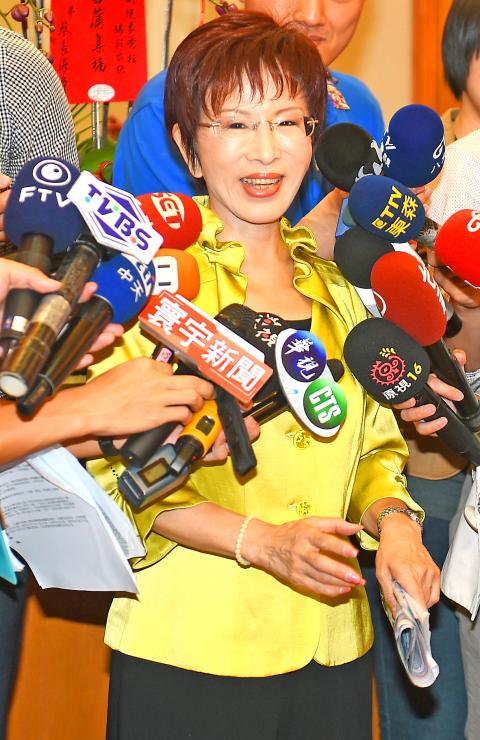The Republic of China (ROC) Constitution allows no possibility of Taiwanese independence, Chinese Nationalist Party (KMT) presidential hopeful Hung Hsiu-chu (洪秀柱) said yesterday, when asked whether she would take a more radical approach to pushing for cross-strait unification.
“You can look at the ROC Constitution. Does it allow for Taiwanese independence?” the deputy legislative speaker told reporters, when she was asked for her views on media commentaries that said she would accelerate the process of unification if she wins the presidential election in January.
Cross-strait policy under any administration must respect the Constitution, Hung said, adding that even Democratic Progressive Party (DPP) Chairperson and presidential candidate Tsai Ing-wen (蔡英文) said in a speech at the Center for Strategic and International Studies in Washington earlier this month that she would handle cross-strait relations in accordance with the ROC Constitution.

Photo: Chang Chia-ming, Taipei Times
The beginning of the Additional Article of the Constitution states that any articles that are added to or amended in the Constitution are to “meet the requisites of the nation prior to national unification,” Hung said.
That clearly shows the ROC Constitution is based on the “one China” principle, she added.
Hung said that what worries Taiwanese is the prospect of unification taking place on China’s terms, because China wishes to apply its “one country, two systems” formula in the unification of Taiwan, while Taiwan wants to see a unified China characterized by freedom, democracy and the rule of law.
Hung again pledged to sign a peace treaty with China if she is elected president, saying the idea had been proposed in the past by former presidents Lee Teng-hui (李登輝) and Chen Shui-bian (陳水扁) as well as President Ma Ying-jeou (馬英九). She added that Tsai helped formulate Chen’s proposal when she served as Mainland Affairs Council minister.
“I did not invent the idea. They did not follow through with it, probably because it aroused some suspicion among the public, but if the idea is in the interests of Taiwan, we should make it clear to the public,” Hung said.
She added that signing a cross-strait peace treaty is consistent with the so-called “1992 consensus,” referring to a tacit understanding between the KMT and the Chinese government that both sides of the Taiwan Strait acknowledge there is “one China,” with each side having its own interpretation of what “China” means.
“There is no difference between the two. What we need to think about is whether we should take a step further into the ‘deep-water zone’ beyond the ‘1992 consensus’ and whether we should try to make a breakthrough in cross-strait relations or whether we would rather stay where we are now,” Hung said.

Alain Robert, known as the "French Spider-Man," praised Alex Honnold as exceptionally well-prepared after the US climber completed a free solo ascent of Taipei 101 yesterday. Robert said Honnold's ascent of the 508m-tall skyscraper in just more than one-and-a-half hours without using safety ropes or equipment was a remarkable achievement. "This is my life," he said in an interview conducted in French, adding that he liked the feeling of being "on the edge of danger." The 63-year-old Frenchman climbed Taipei 101 using ropes in December 2004, taking about four hours to reach the top. On a one-to-10 scale of difficulty, Robert said Taipei 101

A preclearance service to facilitate entry for people traveling to select airports in Japan would be available from Thursday next week to Feb. 25 at Taiwan Taoyuan International Airport, Taoyuan International Airport Corp (TIAC) said on Tuesday. The service was first made available to Taiwanese travelers throughout the winter vacation of 2024 and during the Lunar New Year holiday. In addition to flights to the Japanese cities of Hakodate, Asahikawa, Akita, Sendai, Niigata, Okayama, Takamatsu, Kumamoto and Kagoshima, the service would be available to travelers to Kobe and Oita. The service can be accessed by passengers of 15 flight routes operated by

Taiwanese and US defense groups are collaborating to introduce deployable, semi-autonomous manufacturing systems for drones and components in a boost to the nation’s supply chain resilience. Taiwan’s G-Tech Optroelectronics Corp subsidiary GTOC and the US’ Aerkomm Inc on Friday announced an agreement with fellow US-based Firestorm Lab to adopt the latter’s xCell, a technology featuring 3D printers fitted in 6.1m container units. The systems enable aerial platforms and parts to be produced in high volumes from dispersed nodes capable of rapid redeployment, to minimize the risk of enemy strikes and to meet field requirements, they said. Firestorm chief technology officer Ian Muceus said

MORE FALL: An investigation into one of Xi’s key cronies, part of a broader ‘anti-corruption’ drive, indicates that he might have a deep distrust in the military, an expert said China’s latest military purge underscores systemic risks in its shift from collective leadership to sole rule under Chinese President Xi Jinping (習近平), and could disrupt its chain of command and military capabilities, a national security official said yesterday. If decisionmaking within the Chinese Communist Party has become “irrational” under one-man rule, the Taiwan Strait and the regional situation must be approached with extreme caution, given unforeseen risks, they added. The anonymous official made the remarks as China’s Central Military Commission Vice Chairman Zhang Youxia (張又俠) and Joint Staff Department Chief of Staff Liu Zhenli (劉振立) were reportedly being investigated for suspected “serious